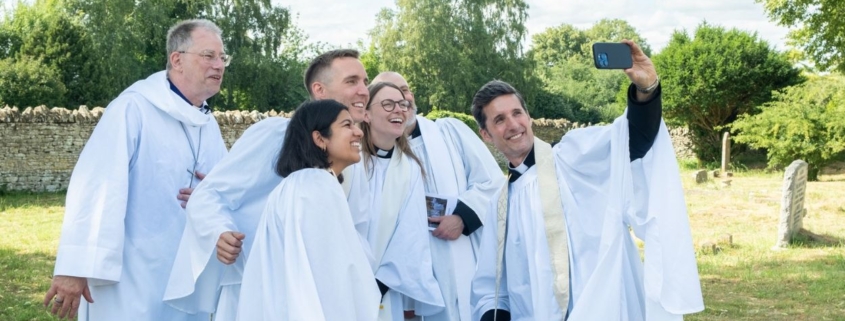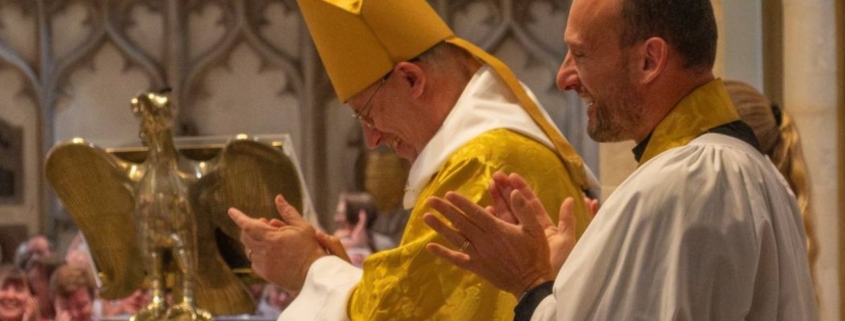Petertide 2025
Thank you so much for being willing to undertake this ministry of a deacon and priest within and for the Church of God. Thank you for all this has meant already in terms of the long road of discernment and vocation. Thank you for bearing with the imperfections and uncertainties of the Church. Thank you for all your families and those close to you have undertaken in sharing this journey with you. Thank you for the ministry you are offering and will offer across this diocese in the coming years.
In this final charge before your ordination as priest I very much want to offer you St Paul’s words rather than my own. Probably I should say Luke’s distillation of Paul’s words in Acts 20, the address to the Ephesian elders. Those who have studied the speeches in Acts tell us that this is the place in all of Paul’s speeches in Acts where the Paul of the epistles is closest to the Paul of Acts. The speech is a distillation of Paul’s reflections on ministry – a solemn charge. I want to suggest that you set try to set this text at the very heart of your ministry not just for the coming year but in all the years to come, in this very long friendship and offering of yourself.
Luke deliberately chooses to use the three New Testament words which are emerging as ways to describe those who hold office for life in the Church of God in this passage and its framing. These are the words which will carry the understanding of the church in relation to ministry down through the centuries. I think this is the only passage in the New Testament in which each occurs.
An act of service and commission
The speech is addressed of course to the presbyters of the Church in Ephesus (Acts 20:17), who are summoned to gather on the beach at Miletus. Paul refers in the speech to his own ministry as a diakonia: both an act of service and as a commission:
But I do not count my life of any value to myself, if only I may finish my course and the diakonia that I received from the Lord Jesus, to testify to the good news of God’s grace.
Acts 20:24
The presbyters likewise are being given a commission, a diakonia. In the following paragraph they are also described very clearly as episcopoi, overseers, the word from which we derive the English word and title bishops:
Keep watch over yourselves and the whole flock of which the Holy Spirit has made you episkopoi, overseers, to shepherd the church of God that he obtained with the blood of his own Son.
Acts 20:28
We have three orders of ministry but also three interwoven dimensions of ministry embracing the commission to be servant-evangelists – deacons; the commission to be ministers of word and sacrament – priests or presbyters; the commission to be exercise oversight and leadership across Church and society, whether our particular role or license is to be a curate, a vicar, a chaplain, a scholar, or a bishop.
Treasure these words
Acts 19 has exercised a seminal influence over the Christian church’s understanding of what it means to be ordained to these ministries: you will find echoes of this text in every ordinal and in many of the classical reflections on ministry including Gregory the Great’s Pastoral Rule, the Rule of Benedict, George Herbert’s Priest to the Temple and Richard Baxter’s Reformed Pastor. There is so much here about the life of the minister relevant to every generation. Take these words and treasure them.
Treasure first the core principle with which the speech begins and ends: the principle that Christian ministry is incarnational. This is about who we are before it is about what we do.
Look carefully at the way Paul begins his address. Looking back at his ministry he does not say: You know how skilfully I preached. He does not say: You will remember the amazing vision to which I called you. He does not even say first: Remember the gospel I taught you, though he does absolutely go there next.
You know how I lived
Instead Paul simply says this: You know how I lived. Literally: you know how I was among you. Even better if less elegant: You know how I was becoming among you. The Greek word is egenomen.
How long did Paul stay in Ephesus? Three years, Acts will tell us (31) – about the length of a curacy. Amazing things happened in terms of the growth of the church and great miracles. Yet Paul does not say: remember the conversions, the riots, the book burning, the healings. He says this:
You yourselves know how I lived among you the entire time from the first day that I set foot in Asia, serving the Lord with all humility and with tears, enduring the trials that came to me through the plots of the Jews.
People will remember who we are when they have forgotten everything we may have said or done. Paul returns to the same theme at the end of his speech in a wonderful final section:
You know for yourselves that I worked with my own hands to support myself and my companions. In all this I have given you an example that by such work we must support the weak, remembering the words of the Lord Jesus for he himself said: It is more blessed to give than to receive.
Acts 20:34-35
Paul goes on then to describe both what he did and what he said. It is not that these things are unimportant. But they are secondary in ministry to the whole person we seek to be, the whole person we are becoming, the humility, tears and endurance we bring to the lifelong commission to which we have been called. Paul describes the care he takes over his teaching ministry, both the methods he follows and the content of that ministry.
Paul’s gospel has a clear core: repentance towards God and faith towards our Lord Jesus. His gospel also has the widest possible horizons of the kingdom of God. References to the kingdom are quite rare in Acts but here we are clear of the breadth of this message: not personal salvation only but the coming reign of God of justice and of peace for the whole of creation:
And now I know that none of you, among whom I have gone about proclaiming the kingdom will ever see my face again.
Acts 20:25
Watch over yourselves
You will know and understand that this diaconal, priestly, episcopal ministry in communities is difficult. You will know it is about the whole of who we are before God, both what we do and what we say. You will know the seriousness of the responsibility now to be committed to you.
And for that reason Paul would have all of us hear this very, very clearly. Because this ministry is so demanding – and hear this from someone who has been ordained for over 40 years – because this ministry is so demanding, watch over yourselves and then over all the flock.
Take responsibility for your own wellbeing. You are a precious child of God. You are called to flourish in ministry year after year, decade after decade, not to burn out in the first five years. Pace yourself. Husband your resources. Grow sustainable disciplines. Challenge unfair expectations and systems. Take good time off. Guard your family time. Befriend your inner drivers that cause you to overwork. Hold yourself accountable and look for that accountability in others. Watch over yourselves and then you will be able to watch over the flock. This is the scriptural, biblical order for your ministry and the pattern you need to teach to others.
With tears
There is more on hardship and difficulty in the passage, good places to return when things get tough. But let me end on the tears as a sign of the depth of your calling.
The passage is remarkable for no fewer than three references to tears. The first is in verse 19: serving the Lord with all humility and with tears. Paul describes the hardships of persecution, difficulty, perhaps frustration at the way the world is, at the way people treat each other. The tears of a prophet.
The second is in verse 31: Therefore be alert, remembering that for three years I did not cease night or day to warn everyone with tears. These are the tears of the pastor, the evangelist living with and among God’s people and seeking to see them formed into the likeness of Christ.
The third reference is in verse 37: There was much weeping among them all; they embraced Paul and kissed him, grieving especially because of what he had said that they would not see him again.
One of the extraordinary gifts and graces of ministry is the capacity to love an ever widening, ever changing group of people, to share in the love of Christ for his church. At the heart of ever call to ministry as deacon or priest is very simply a call to love. Remember Jesus’ threefold question to Peter:
Simon, son of John, do you love me more than these? Feed my lambs.
Simon, son of John, do you love me? Tend my sheep.
Simon, son of John, do you love me? Feed my sheep.
The threefold reference to tears is the inverse of of the cost of love. The call to be a deacon or priest is primarily a call to love Jesus by loving God’s world and a call to love Jesus by loving God’s church, the Body of Christ. God’s world and God’s church are manifestly imperfect and hard to love. That loving will involve grief and tears and many new beginnings.
It is this love which is at the heart of our ministry. And it is knowing we are loved by God and by others which gives us the strength to dare to undertake this ministry.
May God bless you richly in all you seek to be and to do in God’s name now and in the years to come.
Amen.


